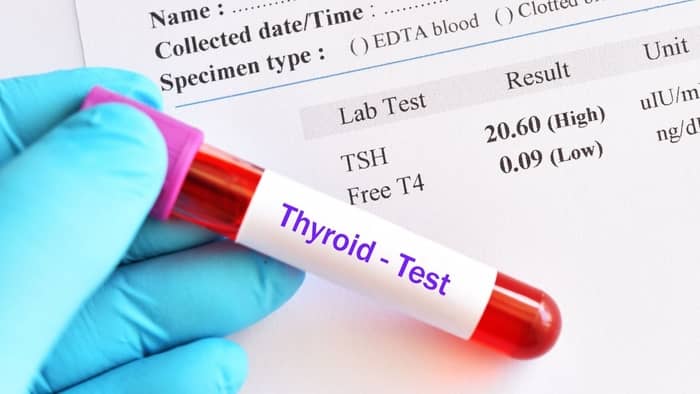Last Updated on January 11, 2022
Today we’re going to be taking a look at underactive thyroid and gluten intolerance. There is no doubt that there is a gluten thyroid connection. We’ll be taking a look at what underactive thyroid is and the connection between the two. We’ll also be looking at foods to eat when following a gluten-free diet for thyroid problems.
What Is Underactive Thyroid?
Underactive thyroid (hypothyroidism) is when your thyroid gland does not produce enough hormones. The thyroid gland helps to maintain metabolism. There’s no way to prevent this from happening, but there are ways to treat it and keep symptoms at bay.
Symptoms may develop gradually and include:
- tiredness
- weight gain
- constipation
- muscle pains
- weakness
- changes to periods
You can be tested for thyroid by having a simple blood test.

Find more information about Is Amoxicillin Gluten Free? (Gluten Free Medications)
Celiac Disease and Hypothyroidism
As you probably already know, celiac is an autoimmune disease. What you may not know is that there’s a link between many autoimmune diseases. This is probably why research has found that thyroid diseases are more common among celiacs than anyone else.
Up to 90% of low thyroid cases are caused by a disease called Hashimoto’s. Hashimoto’s is when your immune system attacks your thyroid. Hashimoto’s is an autoimmune problem, whereas hypothyroidism is a problem with the gland.
There is a plethora of evidence to suggest that following a gluten-free diet for thyroid is hugely beneficial. Regardless of whether you have celiac disease or live with gluten sensitivity, it’s been proven that gluten can trigger an autoimmune attack. In fact, if you suffer with thyroid problems, you may not even know that gluten could be causing symptoms to be worse.
Almost 3/4 of low thyroid patients found that their symptoms improved once they had followed a strict gluten-free diet for a long period of time. Some celiac patients even suggest a lesser need for medication when following the diet. This is likely because the medication is able to absorb better, as the small intestine has had time to heal.
However, removing gluten can not cure any form of thyroid problems and it isn’t just gluten that can be an issue. That’s important to remember.
Dairy may also become a trigger for you if you have thyroid problems, so it may be worth making a food diary if you have just got your diagnosis.
There is a great article here, which can tell you more scientifically accurate information about the connection between thyroid disorders and gluten.
Hashimoto’s
As I mentioned earlier, Hashimoto’s is a disease that attacks the thyroid gland. This can result in hypothyroidism. Surprisingly, gluten’s structure is very similar to the tissue of thyroid. This can happen in those that life with celiac disease, or gluten sensitivity. Although gluten sensitivity is far more common (and what I have).
The immune system’s main duty is to protect your body from foreign attacks. Your body may mistake certain foods as an attack. If you continue to eat that food, your body struggles to keep fighting. This will heighten the sensitivity to those particular foods. Therefore making you more likely to develop food sensitivities and autoimmunity.
Some people believe it is a myth that gluten has an impact on hypothyroidism, but the heaps of evidence on this suggest otherwise!
Even if you’re given a diagnosis for Hashimoto’s and your celiac test comes back negative, the gluten-free diet can still be beneficial. Usually, if you’re feeling that ill, you’ll be open to trying anything. I know I certainly did! The gluten-free diet can feel very overwhelming at times, especially when you’re first told to try it. So let’s take a look at what the gluten-free diet entails.
Gluten-Free Diet for Thyroid
Whether you believe it or not, removing gluten has been proven to help patients with thyroid. This may be because the gluten-free diet can reduce inflammation and cause a lower inflammatory response. As a large proportion of sufferers with either disease, can suffer with both, gluten should be the first thing to go from your diet; if it isn’t already.
Gluten is a protein you will find in grains such as wheat, rye, barley, and oats. It’s in a surprising amount of foods, so here’s some foods to avoid if this is all new to you.
- Bread
- Cereals
- Cakes
- Pasta
- Pies
- Gravies
This list is by no means extensive, but these foods are the ones that most often have gluten-free alternatives in stores. Gluten can be in almost anything, so it’s always best to check the label of anything you may be buying.
Always be wary of cross-contact when eating out, especially. But it can even occur in your own home. A small amount of gluten protein is enough to trigger an autoimmune response, so it’s best to be as careful as you can; when eating out and preparing food at home.
Living With Thyroid/Celiac Disease
To conclude, there is a lot of evidence to prove the links between thyroid conditions and gluten. And the best course of action when receiving a hypothyroidism diagnosis is to opt for the gluten-free diet. On the flip side, if you’re celiac and start experiencing any of the symptoms that are listed above, you may want to be tested for thyroid conditions. Remember, celiacs are far more susceptible to developing thyroid problems.
However, before you make any assumptions of diseases/disorders you may have, or make any drastic changes to your diet, it’s always important to speak to a dietician or a healthcare professional who can offer medical advice on the best course action.
If you live with both of these conditions (underactive thyroid and gluten intolerance), I would love to hear from you in the comments below. Did you notice any differences when removing gluten from your diet? Positive and negative experiences are more than welcome. I’m currently going through testing for thyroid problems at the moment – so it’s very bizarre timing for me to be writing this article!
Learn more about: Does Indian Food Have Gluten?

Hi, my name’s Zoë. I’m 28 years old and live in London, UK. I work full time as a freelance writer and critic for West End theatre. Writing has been a passion of mine for as long as I can remember. I spend most of my free time at the theatre, or at conventions. I’m married to the love of my life, and live in a small apartment with my fur baby, Lillie. I run two of my own blogs: No Safer Place and Stage to Page: both of which have won awards. I also have a YouTube channel where I talk about all things stagey.
